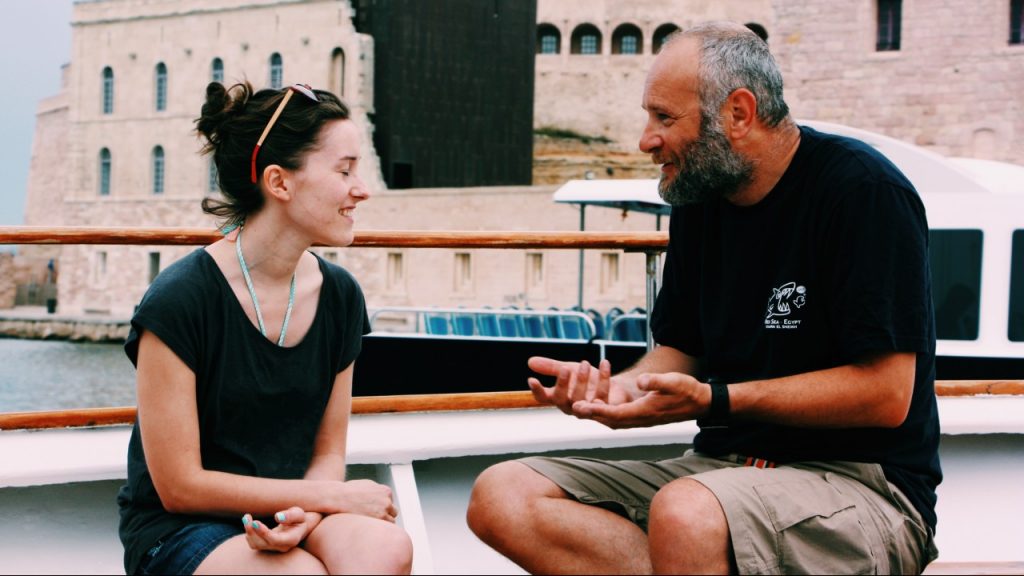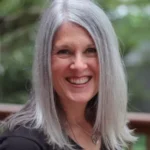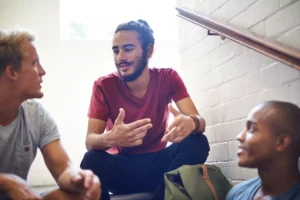The first time I went to a professor’s office after class, it’s because I was summoned. It was freshman English and we were getting our grades on our first writing assignment. This will be good, I thought to myself, having just come from a high school where I wrote for both the newspaper and yearbook. I stared with confusion at her handwritten note: See Me. What a strange thing to write. And no grade. It must be so good, she wants to tell me in person, I reasoned.
I trudged to her office later that day, a little nervous about the whole episode. Was she going to recommend me for further scholarship money? Did she want to hire me as her personal editorial assistant? I might as well find out.
“Professor Konyndyk?”
“Oh, Candice, come in.” She jumped right in, “your paper really needs work. I didn’t want to fail you, so I thought I’d give you a chance to start over. Do a rewrite.”
Fantasy shattered. Devastated, I consoled myself with the fact that at least she hadn’t given me an F.
I was never a library dweller or great test taker and my papers were written with much haste, often the night before they were due. Don’t get me wrong, my grade-point-average was respectable, but I really struggled to learn with my nose in a book. Looking back, I realize my best learning happened during office hours. My favorite time was spent with professors, one-on-one, getting their input on life.
The benefit of this was not immediately apparent, however. That first encounter nearly ruined it for me. But a few hours after my trip to the woodshed, I started to realize this prof was giving me a chance; a chance to try again and, as she exhorted, to become a better writer in the process.
I spent several hours with her outside of class that semester, working through my papers and learning the importance of outlines, paragraphs that stick to one subject and the subtleties of effective transitions. Her praise for my improvement was addictive. I worked harder for her than my other instructors; eager to earn the approval of the professor who was pouring some of herself into me.
Even though our time together was structured around English and seldom veered into the personal, I felt her influence on me beyond my writing. I still remember the readings she did at the start of each class from Lament for a Son, a book by another professor whose son died tragically in a mountain-climbing accident. Her empathic readings of the journal-like book left a lasting impression. It’s like she wanted us to know that although she was paid to teach English, there was a lot more beyond textbooks worth learning. When her husband died unexpectedly of cancer several years later, I realized that tragedy had struck not just my professor, but my friend.
I call Professor Konyndyk every so often, just to check in and see how she’s doing. I think deep down, I still long to know that I’m writing articles that are worthy of more than a “See Me” grade.
During my junior year I met Dr. Simpson, a professor in the school of business. But he was no buttoned-down accountant. He had really lived, had served as an officer in the Navy, ran marathons, earned his M.B.A. and Ed.D., and above all, had a vibrant faith. He stood out for his ability to integrate faith and learning. Like other professors at my Christian school, he opened his classes with devotions, but the influence of his faith didn’t stop there. It seemed woven into the fabric of what he taught. And more importantly, it was woven into his life.
Because I admired his integrity, I listened to him. I was willing to receive his advice. “Don’t rush off to graduate school,” he said. “Get a job first, even if it’s flipping burgers; just get some life experience.” Coming from my Dad or even my roommates, advice like that fell flat. But from Simpson, it was, to me, enlightened. I trusted him and craved his input on life after college.
I was drawn to his office, dropping by to fill him in on what was happening. And the amazing thing is that he really seemed interested in what I had to say. Oh sure, he was being paid to have his door open to students, but he really invested in me and responded in a way that earned my respect.
It turns out he was right. After graduation, I packed up and moved to Washington, D.C. where I worked as an intern on Capitol Hill. Within two months, I was hired by a congressman. Eleven years, a husband and two kids later, I’m glad I listened and squeezed that life experience in between college and grad school. There’s no way I could do that kind of work now and I wouldn’t want to have missed it.
After three years of work, I followed through with graduate school. Even there the lure of office hours was strong. Dr. Morken was the ultimate challenge. If there was one word to describe him, it was intimidating.
From the very beginning, Morken made it clear that he was in charge and we would do well to follow him. He was militaristic in calling the roll and explaining his use of the Socratic method. Never come to class unprepared was the rule. Other professors’ reading assignments slipped, but never Morken’s. He would name one student and test their knowledge of the reading by asking questions. “Don’t look at the book,” he’d bark to anyone clumsy enough to get caught looking down. It was terrifying, but motivating and in a strange way, thrilling. To get through the class with successful answers was like winning a major contest.
Early on, I approached him in the hall after class with comments about the reading. He engaged, but was unimpressed. The more enigmatic he seemed, the more determined I was to break through.
The first few times I dropped by his office, it was awkward. I had to reintroduce myself, a maddening fact for someone used to having professors respond with more enthusiasm. We students were convinced it was a tactic he employed to keep us from getting too chummy with him. I stumbled around for conversation, relying on class material, trying to find something else we could talk about.
Finally I saw my way in. One day I was walking by his office, and I saw Hubert Morken squinting at his computer screen, hunting and pecking at keys with just two fingers. This was the tech guru who was forever preaching the importance of the Internet — only recently made public — and assuring us it was the wise student who learned as much about it as possible. He was making all of our lives miserable requiring us to learn html and he didn’t even know the basics of Word and Excel! The first time I helped him with a word-processing problem, he lit up. It wasn’t long before I was working as his graduate assistant, coordinating the research for his book and teaching him what I knew about PCs.
In exchange, he was talking about life and books and adventures. We became friends in the process. He helped me and five other classmates launch a webzine of our own. It became the school’s official publication. He was ecstatic over all the advances in web publishing and his enthusiasm was infectious. He assured us that if we learned these skills, we would be ahead of the pack when it came time to look for jobs.
In many ways, the Webzine you’re reading is the fruit of Dr. Morken’s labors. The vision for Boundless began as a passion for the medium and a conviction that the Internet was a new frontier. During my early failures to get his attention, I couldn’t have imagined how much his influence would spark. He’s a good reminder that mentors aren’t always easy to find. You may have to look in unusual places and overcome personality quirks in the process, but they’re worth the effort. And all campuses have at least one professor worth getting to know beyond the classroom.
It would be years before I would realize just how valuable, and rare, this type of friendship is. Every January, my husband and I spend a day planning what we hope to accomplish in the coming year. This year, we carried over an item from last year’s list: find mentors. We know how valuable they are because we experienced them in college and graduate school. Now we feel the vacuum. It’s not that only college campuses house wise teachers, it’s that beyond the ivy-covered buildings, people are too busy. They don’t have the luxury of spending hours influencing young lives.
I think of Professors Konyndyk, Simpson and Morken often, wondering what they would do or say in certain situations. These professors still occupy a place in my heart and their words still resound in my mind. My time with them was part of a limited season of life. The one-on-one unhurried access to them created opportunities to learn so much more than what filled the textbooks they were paid to teach.
Copyright 2003 Candice Watters. All rights reserved.











